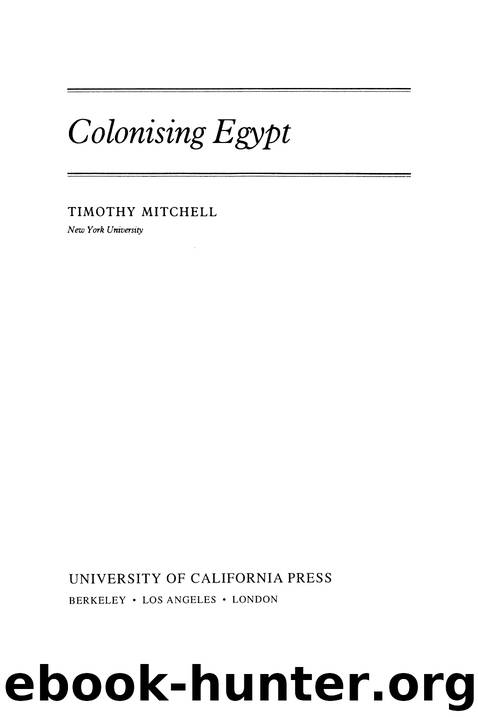Colonising Egypt by Mitchell Timothy;

Author:Mitchell, Timothy;
Language: eng
Format: epub
Publisher: University of California Press
Published: 1991-11-06T05:00:00+00:00
Self-help
All those writers involved in the organisation of schooling developed the theme of indolence and industry in discussing the mentality of the Egyptian – including the Inspector-General quoted above, and Ali Mubarak. They were assisted by a continuing translation of books from Europe on the same theme. Probably the most influential of these translations was by the editor of the Cairene journal al-Muqtataf, Ya`qub Sarruf. In 1880 when he was a teacher in Beirut, Sarruf translated into Arabic the famous book by Samuel Smiles, Self-Help, with Illustrations of Conduct and Perseverence.41
The theme of Self-Help coincided exactly with practices taking shape in Egypt. ‘The worth and strength of a state’, wrote Smiles, ‘depend far less on the form of its institutions than on the character of its men. For the nation is only an aggregate of individual conditions, and civilisation is but a question of . . . [their] personal improvement.’42 The book was about ‘character’ (akhlaq in the Arabic translation), and about the ‘moral discipline’ (tarbiya) by which those of an idle character are made ‘industrious’ (mujtahid). The habit of industry (al-ijtihad) is the moral quality upon which the state and its progress depend. ‘National progress is the sum of individual industry, energy, and uprightness, as national decay is of individual idleness, selfishness, and vice.’43
The book made ‘character’ the object of its study in order to make three arguments, each of which was to contribute to its enormous usefulness in Egypt: (1) that the political task of those who govern is to mould individual habits and morals; (2) that government should not concern itself therefore with further legislation or greater rights, all of which lead to ‘overgovernment’ while failing to make the idle industrious; and (3) that to make the idle industrious requires the discipline and training of an education – the aim of which is not to supply knowledge as a ‘marketable commodity’ whose acquisition makes men ‘better off’, but to train those who must do society’s daily work in the mentality of perseverence and industry.44
The translation was used as a reader at the Syrian Protestant College (later the American University) in Beirut, where Sarruf taught, and its vocabulary and ideas influenced a generation of students there.45 Several of these students, together with Sarruf, were driven out of Beirut in the 1880s by their American employers, for espousing the theories of Darwin. They moved to Egypt, to work and to write under the patronage of the British. No more devout believers in the ideas of self-help could have been found in this period than the British administrators in Egypt. The British considered their task to be to relieve Egypt of the evil of overgovernment, so that the productive capacity of the Egyptian peasant could be realised to the full.46
Several events indicate the impact of Smiles’ book in Egypt. In 1886 a Self-Help Society was founded in Alexandria.47 In 1898 Mustafa Kamil, the young leader of the nationalist opposition to the British occupation, founded a private school – an act which he declared to be his own practical application of the doctrine of self-help.
Download
This site does not store any files on its server. We only index and link to content provided by other sites. Please contact the content providers to delete copyright contents if any and email us, we'll remove relevant links or contents immediately.
| Africa | Americas |
| Arctic & Antarctica | Asia |
| Australia & Oceania | Europe |
| Middle East | Russia |
| United States | World |
| Ancient Civilizations | Military |
| Historical Study & Educational Resources |
Empire of the Sikhs by Patwant Singh(22769)
The Wind in My Hair by Masih Alinejad(4846)
The Templars by Dan Jones(4558)
Rise and Kill First by Ronen Bergman(4547)
The Rape of Nanking by Iris Chang(4024)
12 Strong by Doug Stanton(3420)
Blood and Sand by Alex Von Tunzelmann(3060)
The History of Jihad: From Muhammad to ISIS by Spencer Robert(2507)
Babylon's Ark by Lawrence Anthony(2433)
The Turkish Psychedelic Explosion by Daniel Spicer(2246)
No Room for Small Dreams by Shimon Peres(2238)
Gideon's Spies: The Secret History of the Mossad by Gordon Thomas(2236)
Inside the Middle East by Avi Melamed(2233)
Arabs by Eugene Rogan(2196)
The First Muslim The Story of Muhammad by Lesley Hazleton(2155)
Bus on Jaffa Road by Mike Kelly(2036)
Come, Tell Me How You Live by Mallowan Agatha Christie(2029)
Kabul 1841-42: Battle Story by Edmund Yorke(1924)
1453 by Roger Crowley(1881)
